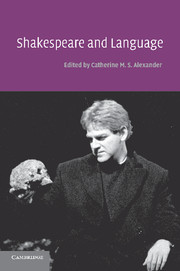Book contents
- Frontmatter
- Contents
- List of contributors
- Editor's note
- 1 Shakespeare and language: an introduction
- 2 Shakespeare's language and the language of Shakespeare's time
- 3 The foundations of Elizabethan language
- 4 Shakespeare's talking animals
- 5 Some functions of Shakespearian word-formation
- 6 Shakespeare and the tune of the time
- 7 Shakespeare's Romeo and Juliet: the places of invention
- 8 Shakespeare's thematic modes of speech: Richard II to Henry V
- 9 Hamlet and the power of words
- 10 The art of the comic duologue in three plays by Shakespeare
- 11 Hamlet's ear
- 12 ‘Voice potential’: language and symbolic capital in Othello
- 13 The aesthetics of mutilation in Titus Andronicus
- 14 ‘Time for such a word’: verbal echoing in Macbeth
- 15 Household words: Macbeth and the failure of spectacle
- 16 Late Shakespeare: style and the sexes
- Index
12 - ‘Voice potential’: language and symbolic capital in Othello
Published online by Cambridge University Press: 15 December 2009
- Frontmatter
- Contents
- List of contributors
- Editor's note
- 1 Shakespeare and language: an introduction
- 2 Shakespeare's language and the language of Shakespeare's time
- 3 The foundations of Elizabethan language
- 4 Shakespeare's talking animals
- 5 Some functions of Shakespearian word-formation
- 6 Shakespeare and the tune of the time
- 7 Shakespeare's Romeo and Juliet: the places of invention
- 8 Shakespeare's thematic modes of speech: Richard II to Henry V
- 9 Hamlet and the power of words
- 10 The art of the comic duologue in three plays by Shakespeare
- 11 Hamlet's ear
- 12 ‘Voice potential’: language and symbolic capital in Othello
- 13 The aesthetics of mutilation in Titus Andronicus
- 14 ‘Time for such a word’: verbal echoing in Macbeth
- 15 Household words: Macbeth and the failure of spectacle
- 16 Late Shakespeare: style and the sexes
- Index
Summary
Before Brabanzio complains to the Venetian senators of Othello's marriage, Iago warns Othello that ‘the magnifico is much beloved, / And hath in his effect a voice potential / As double as the Duke's’. Brabanzio's words will exert power – the power to ‘divorce you, / Or put upon you … restraint or grievance’ (1.2.12–15). Their power, however, will depend not upon Brabanzio's rhetorical skill but instead upon his social position – that is, both on his aristocratic status (‘magnifico’) and on the accumulated credit he has with his auditors (‘much beloved’). How his speech is received will depend less on what he says than on the social site from which it is uttered. Othello rebuts Iago's position, but he does not dispute Iago's presupposition that linguistic competence counts for less than rank or otherwise attributed status in this matter of ‘voice potential’: ‘My services which I have done the signory’, he responds, ‘Shall out-tongue his complaints’ (1.2.18–19). In the event, Othello's voice does outweigh Brabanzio's, with an unanticipated element affecting the reception of their discourse and the outcome of the scene: that is, the exigency of the military threat to Cyprus.
In ‘The Economics of Linguistic Exchanges’, the French sociologist Pierre Bourdieu develops a market analogy to explain how utterances receive their values in particular contexts and how, in turn, the conditions of reception affect discourse production.
- Type
- Chapter
- Information
- Shakespeare and Language , pp. 213 - 225Publisher: Cambridge University PressPrint publication year: 2004
- 1
- Cited by

